Understanding age limits in drone sports is essential for safe participation. The FAA emphasizes inclusivity, allowing anyone to take the TRUST test without a minimum age requirement. However, participants under 13 need adult supervision and must have their drones registered, as registration is mandatory for those owning drones between 0.55 and 55 lbs. Many competitions set a minimum age of 13, and younger pilots can join junior divisions. These regulations guarantee safety and responsibility while encouraging youth involvement. By getting familiar with these rules, you'll discover how age limits shape the future of drone sports.
Overview of Age Limits
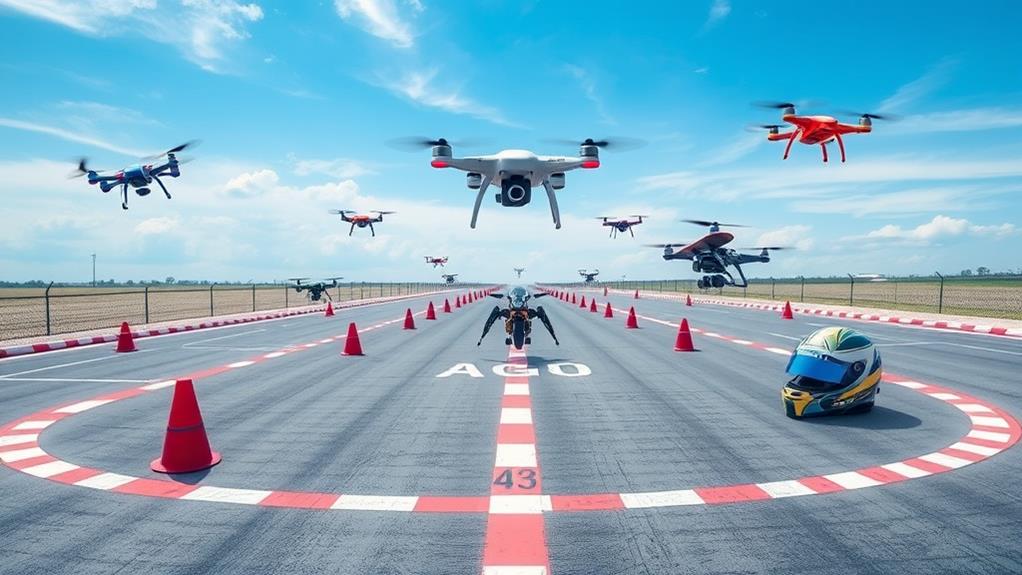
When it comes to age limits for drone sports participants, there's a notable emphasis on inclusivity. The Federal Aviation Administration (FAA) has established regulations that focus on promoting safe practices rather than imposing strict age restrictions.
For recreational UAS (Unmanned Aircraft Systems) operators, the TRUST test is a key requirement that guarantees operators understand important drone regulations and safety measures. Interestingly, there's no minimum age to take this test, which opens the door for younger enthusiasts to engage in drone sports.
However, if you're under 13, an adult must register your drone on your behalf, as registration is mandatory for drones weighing between 0.55 lbs and 55 lbs to guarantee accountability and safety a culture of compliance. This guarantees that younger participants still have access to drone flying while adhering to FAA regulations.
Completing the TRUST test is essential for all recreational purposes, as it equips you with essential knowledge about safe drone operation. If you don't complete the test, you could face penalties, regardless of your age.
Importance of Age Restrictions
Age restrictions in drone sports play an important role in promoting safety awareness among participants. By ensuring that operators have the maturity and understanding of safety protocols, these guidelines help foster a responsible environment for competition.
Furthermore, understanding drone operations and capabilities is essential for safe piloting, as it enables participants to respond effectively to various flight conditions essential drone safety guidelines.
Additionally, encouraging youth participation allows young enthusiasts to develop essential skills while learning the importance of compliance and teamwork in this exciting field.
Promoting Safety Awareness
Implementing age restrictions in drone sports can enhance safety awareness among participants. By promoting a solid understanding of regulations and safe flying practices, age limits encourage responsible behavior among drone operators.
Familiarizing younger participants with local UAV regulations is vital for guaranteeing they recognize the importance of compliance in safe drone racing. The TRUST test serves as an essential tool in this initiative, emphasizing that all recreational drone operators must validate their knowledge, regardless of age.
Here are some key points to reflect on about safety awareness in drone sports:
- Knowledge Validation: Completing the TRUST test guarantees all participants understand safety guidelines.
- Accident Reduction: A focus on education and compliance aims to minimize accidents in the drone community.
- Accountability Culture: Encouraging safe practices fosters a culture of responsibility among younger drone enthusiasts.
- Regulatory Compliance: Adhering to safety regulations helps avoid penalties and promotes ethical flying.
- Empowering Youth: Educating all ages about drone safety prepares younger participants for responsible recreational flying.
Encouraging Youth Participation
Drone sports offer an exciting opportunity for young enthusiasts to develop their skills while learning about safety and responsibility. By encouraging youth participation, we can cultivate a community of informed recreational drone operators who understand the importance of safety knowledge.
The FAA emphasizes this focus on safe operation, which is vital for all drone pilots, regardless of age. There are no minimum age restrictions for taking the TRUST test, making it accessible for younger participants. This test, mandatory for all recreational drone operators, highlights essential safety regulations and practices.
When young enthusiasts engage in drone sports, they learn about responsible flying from the outset. This early education fosters a culture of responsibility that benefits the entire drone community. Removing age limits not only encourages youth participation but also helps train a new generation of responsible pilots.
As they gain experience, these young operators contribute to the overall safety of recreational flying. By instilling safety knowledge early on, we can guarantee that the future of drone sports is both enjoyable and secure. In the end, youth engagement in drone sports is a win-win for everyone involved.
Age Requirements by Organization
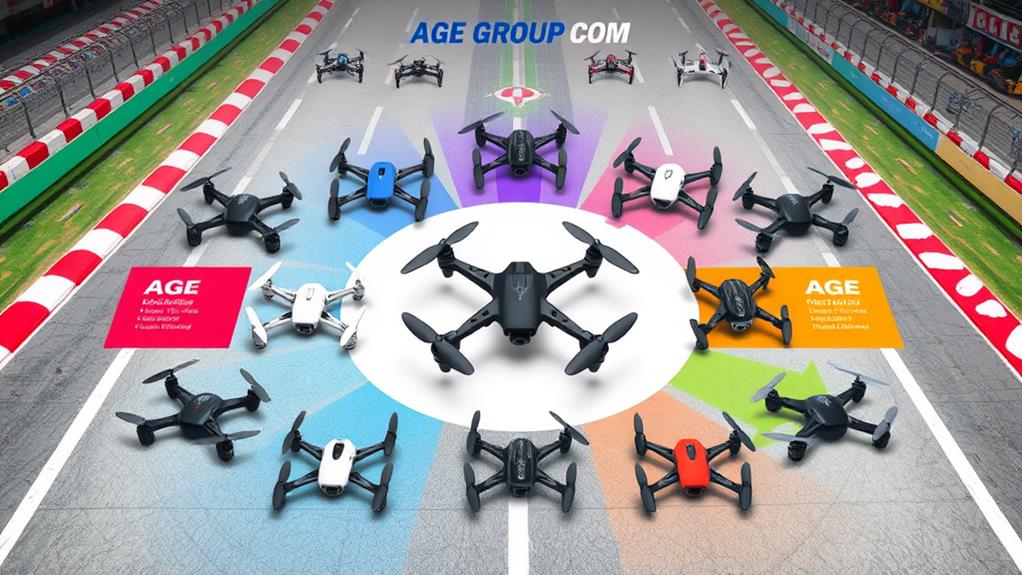
When it comes to age requirements for drone sports, you'll find that different organizations have distinct policies.
For instance, while the FAA doesn't set a minimum age for taking the TRUST test, some events might impose their own age limits.
Understanding these varying requirements can help you navigate participation and even encourage younger enthusiasts to get involved safely and responsibly.
Minimum Age Policies
Many organizations have established specific minimum age policies for participants in drone sports, reflecting their commitment to safety and responsible operation.
Generally, the FAA regulations require individuals to be at least 13 years old to register a drone, although younger operators can still engage in drone sports with adult supervision.
Here's a quick overview of the age requirements:
- The TRUST test has no minimum age requirement.
- Registration for drones mandates a minimum age of 13 years.
- An adult must handle registration if the operator is younger.
- The FAA focuses on safety and knowledge rather than strict age limits.
- Younger enthusiasts are encouraged to participate in recreational flying and drone sports.
It's important to note that compliance with the TRUST test and registration rules is mandatory for all recreational drone operators, regardless of their age.
By understanding and adhering to these minimum age policies, you can guarantee a safe and responsible experience in the exciting world of drone sports.
Engaging in these activities not only sharpens your skills but also fosters a sense of responsibility and community among young drone pilots.
Participation Incentives for Youth
Organizations in the drone sports community are increasingly recognizing the value of engaging young enthusiasts, often without imposing strict age limits. This approach promotes inclusivity and encourages youth to explore their passion for drone flying. Many organizations offer participation incentives, such as scholarships and awards, to motivate young pilots to excel in drone sports.
By allowing all ages to participate, these organizations foster an environment where youth can develop their skills in a supportive setting. Additionally, mentorship programs are commonly available, pairing younger drone pilots with experienced operators. This setup helps cultivate responsible flying practices while enhancing skill development and sportsmanship.
Moreover, the TRUST test, which is mandatory for recreational drone operation, can be taken by individuals of any age. This initiative promotes safety knowledge among youth, ensuring they understand the importance of responsible flying.
Young drone pilots can participate in competitions and events that not only recognize their skills but also encourage a culture of safety and responsibility. By creating these opportunities, organizations successfully engage a new generation of drone enthusiasts, paving the way for the future of drone sports.
Minimum Age for Participation
In the domain of drone sports, age isn't a barrier to entry; instead, knowledge and responsibility take center stage. While the minimum age for registering a drone with the FAA is 13 years, you don't need to be that old to fly. The FAA encourages all aspiring pilots to complete the TRUST test, which doesn't have a minimum age requirement. This test is essential for understanding drone safety and regulations.
Here are some key points to keep in mind:
- You can take the TRUST test at any age, promoting safety knowledge.
- All drone operators must have an FAA registration number if they're flying recreational UAS.
- Parents or guardians must handle registration if the pilot is under 13 years of age.
- Emphasizing drone safety guarantees responsible operation among younger enthusiasts.
- The TRUST test helps create a knowledgeable community of drone pilots, regardless of age.
Age Divisions in Competitions
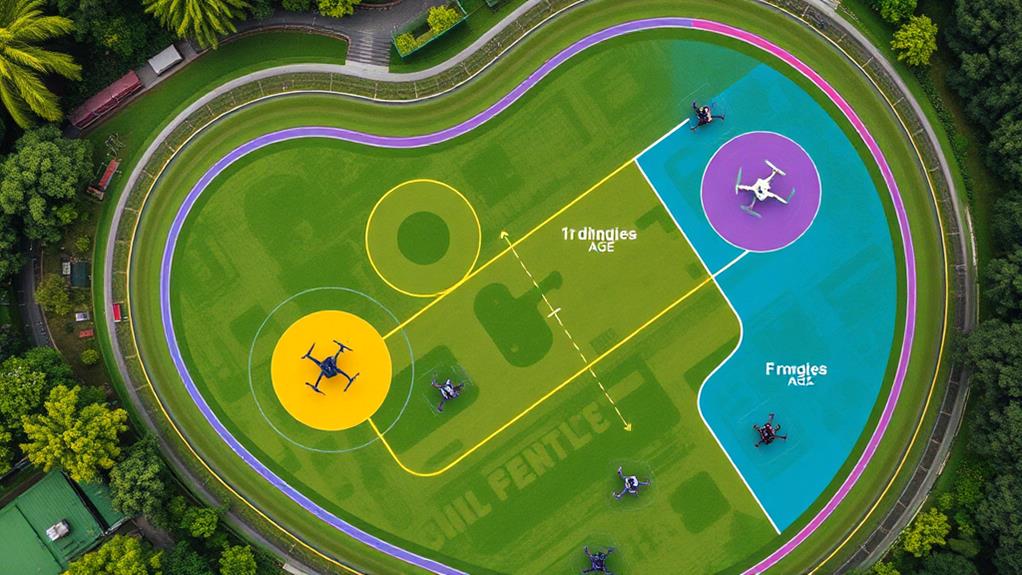
Drone sports competitions often feature age divisions to create a level playing field for participants. These divisions typically categorize competitors into youth (under 18), adult (18-49), and senior (50 and older) categories.
This structure not only guarantees fair competition but also promotes inclusivity, allowing participants to engage with peers who share similar experiences and skill levels.
To compete, many events set a minimum age requirement of 13 years, aligning with the U.S. drone registration regulations. However, specific age limits can vary depending on the organizing bodies, especially across local, national, and international competitions.
For younger pilots, junior divisions in drone racing encourage skill development among aspiring competitors aged 8 to 17, fostering an early interest in drone sports.
Safety Considerations for Youth
Guaranteeing young pilots' safety is essential as they navigate the exciting world of drone sports. To foster this safe environment, everyone flying drones must follow specific safety guidelines and knowledge requirements.
All recreational drone operators, including youth, are required to pass the TRUST test, which instills a sense of accountability. This test guarantees that they understand the critical aspects of responsible flying.
Here are some key safety considerations for young drone pilots:
- Maintain visual line of sight while flying.
- Fly below 400 feet to avoid conflicts with manned aircraft.
- Always check local regulations that may apply.
- Guarantee the drone is registered, especially if it weighs over 0.55 pounds.
- Understand the importance of weather conditions before flying.
Although there's no minimum age to take the TRUST test, young pilots must demonstrate safety knowledge to participate responsibly.
Youth interested in drone sports can begin their journey with confidence, knowing they're equipped with the necessary skills to fly safely. As they grow older and gain more experience, these foundational principles will help them become proficient drone pilots.
Encouraging Young Innovators
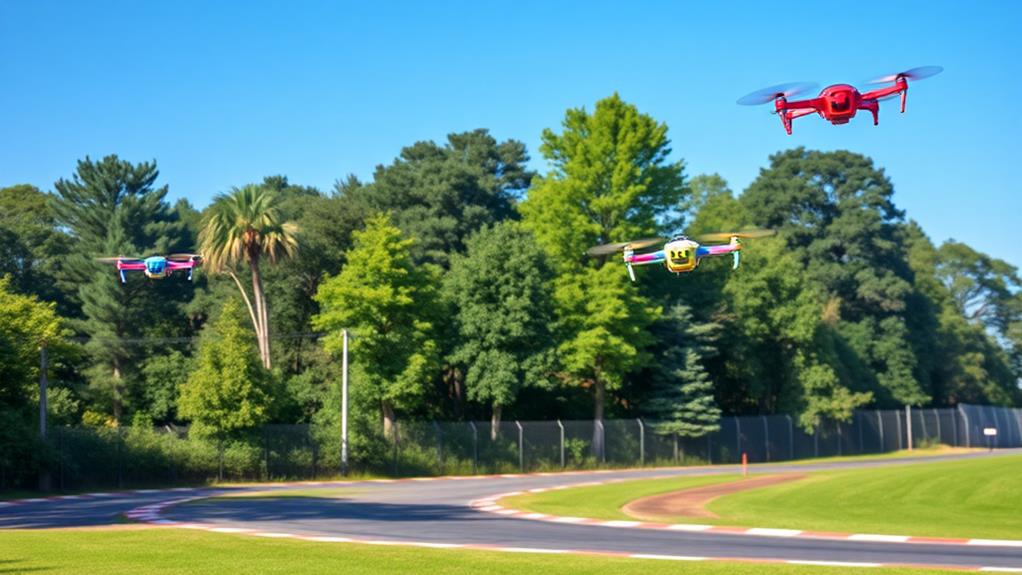
Young pilots equipped with safety knowledge are poised to explore the exciting possibilities of drone sports. With no minimum age requirement for the TRUST test, young innovators can engage in recreational drone operations early on. This encourages participation in drone sports, allowing you to immerse yourself in technology, aerodynamics, and regulations while having fun.
Gaining certification through the TRUST test validates your understanding of drone safety, empowering you to operate responsibly. As drone racing and competitions grow in popularity, you can explore STEM fields in a hands-on environment, enhancing your skills and knowledge.
Community-based organizations play an essential role by hosting events and workshops that teach young people about drone operation. These gatherings not only provide technical knowledge but also foster teamwork and creativity.
Engaging with peers in these settings allows you to share ideas and collaborate on projects, further igniting your passion for drones and innovation.
Compliance With Regulations
Maneuvering the world of drone sports requires adherence to essential regulations that keep you and others safe. To participate in recreational drone activities, you need to comply with the FAA's guidelines.
One vital aspect is completing the TRUST test, which is mandatory for all operators, regardless of age. This encourages younger enthusiasts to join while promoting safety.
Here are key compliance points you should know:
- All drone operators must complete the TRUST test.
- There's no minimum age for taking the TRUST test.
- Registration is required for all drone operators over 13.
- Adult supervision is needed for those under 13 when registering.
- Understanding local and federal regulations is essential.
Resources for Participants
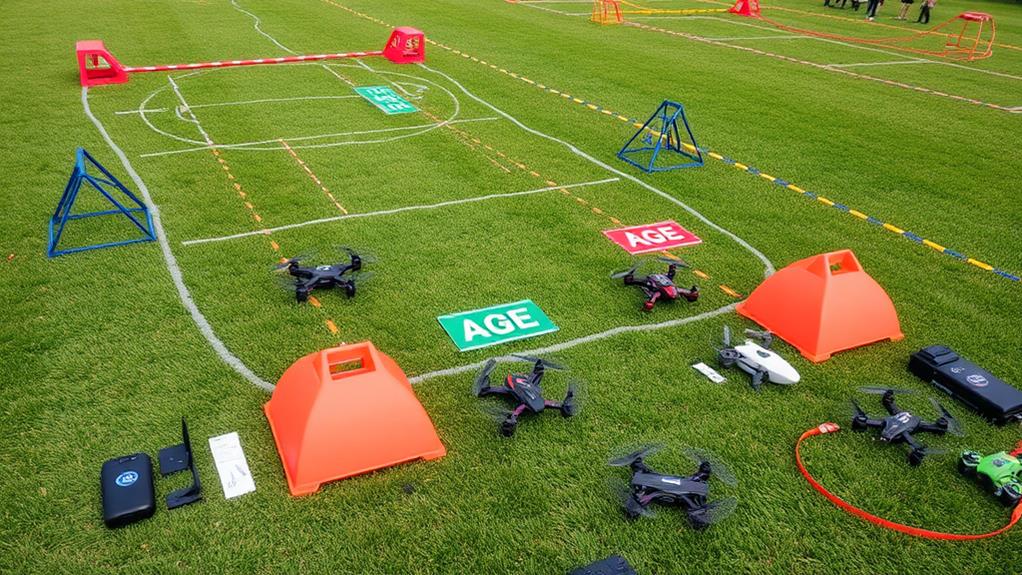
For anyone diving into the world of drone sports, a wealth of resources is available to enhance your experience and knowledge. The FAA's UAS Support Center is a great starting point, offering assistance and information about drone regulations and safety guidelines.
You can easily access the FAA website, which features various study materials and FAQs tailored for recreational drone operators preparing for the TRUST test. This test, which consists of multiple-choice questions about drone safety and regulations, is free and accessible online for participants of any age.
Additionally, joining community forums can be beneficial. These platforms allow drone enthusiasts to share experiences, tips, and resources related to drone sports and operation, fostering a collaborative learning environment.
It's also vital to stay updated on ongoing changes in drone regulations and safety practices, which you can find on the official FAA website.
Conclusion
Understanding age limits in drone sports is essential for fostering a safe and competitive environment. Just like a well-tuned drone, these regulations guarantee that participants are ready to take flight at the right moment. By adhering to age requirements, you not only comply with organizational standards but also promote safety and innovation among young enthusiasts. So, whether you're a seasoned pilot or a budding enthusiast, knowing these guidelines will help you soar to new heights in the world of drone sports.
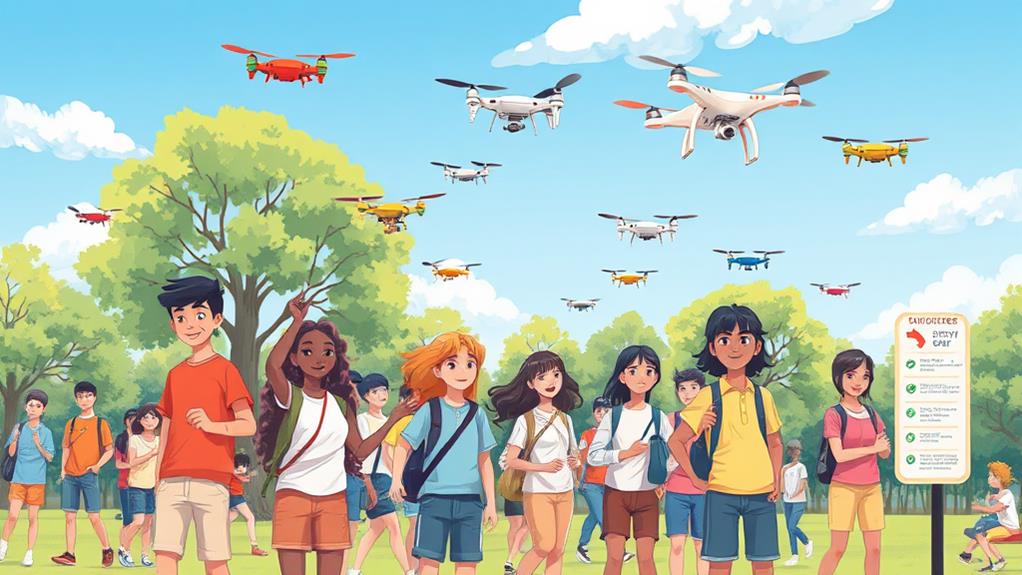
Leave a Reply